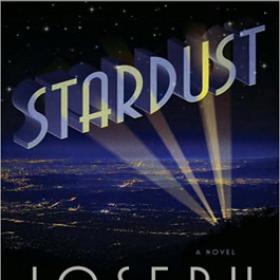Stardust By Joseph Kanon

3.5/5
It took Steven Soderbergh’s subpar adaptation of The Good German to turn Joseph Kanon into something of a literary name, which is too bad because throughout his career (five books now) he has proven that his meticulously researched, richly textured stories deserve better than that stinker of a movie. With his latest, Stardust, he once again sticks with what he knows best; post World War II America and all of the paradoxes contained therein.
Stardust tells the tale of one Ben Collier, an army filmmaker who comes to Hollywood in the mid 1940’s after learning that his brother Daniel, also a director, had an accident and is near death, arriving just in time to see his brother on his deathbed before he passes on. To Ben the whole situation seems very peculiar so he decides to put on his amateur gumshoe hat and open an investigation in the circumstances surrounding his brother’s death. Also prominent in the picture is Daniel’s widow Liesl, a movie star in the making who harbors dark secrets and a hot body that Ben finds difficult to resist. Kanon very clearly is going for a noir-ish atmosphere, and the air is thick with cigarette smoke and everything revolves around Hollywood’s filthy underbelly.
Kanon seems bored by the idea of telling a traditional whodunit and instead attempts to examine the ways that a murder investigation evolves over time. Characters who early on seem imperative to the story fade into the background and then just disappear for good. A lot of time is also spent detailing long, drawn out conversations between Ben and potential witnesses that may or may not prove useful. As the story moves from revelation to revelation Ben has to deal with the changing face of reality, constantly adapting his game plan to suit his new situation.
Eventually stumbling into the early stages of McCarthyism as an aggressive Congressman, Ken Minot, has started subpoenaing members of the movie studio that Daniel worked for, it is only then that Ben is able to step back from his annoying obsession with his brother’s death and realize that something far more nefarious is afoot. The resolution to the murder mystery aspect of the book will elicit a huge "Who cares," but Kanon’s historical fiction is informative and inspiring. The identity of Daniel’s killer is less important than the how and the why and the merging of the murder with historical fact is clever enough to endure the journey even though often times the book proves to be a real slog to get through.
Kanon has carved out a very tiny piece of US history and claimed it all for himself. If it didn’t happen between 1945 and 1950 then he has no interest in writing about it. But he is quite obviously something of an expert on the period and puts that knowledge to good use as a weapon. Here he creates a sumptuous blend of secret Hollywood and public Congressional history that ultimately wins this book a nod of approval. Kanon’s masterstroke, however, comes from the way in which he creates closure for these characters while quietly winking at those readers who know their history.
Anything posing as a "happy ending" is just a mirage as Joseph McCarthy and the cold hard facts of history of waiting just around the corner for them. Yes, this work is an indictment against the anti-Communist crusades that took place in the 40’s and 50’s, but it is not a political screed either. Minot is clearly the villain here but Kanon is too smart to reduce him to caricature. Instead he is shown to be a willful patriot, oblivious to just how closely his behavior mirrors that of Hitler and the Nazi’s he openly despises. The book most certainly will not appeal to those readers only interested in reading about lost symbols or who believe that chapters should be limited to a single page. But then again, you can’t please all the people all the time.
Author: Joseph Kanon
Pages: 512
Publisher: Atria
RELATED ARTICLES
Get the most-revealing celebrity conversations with the uInterview podcast!







Leave a comment